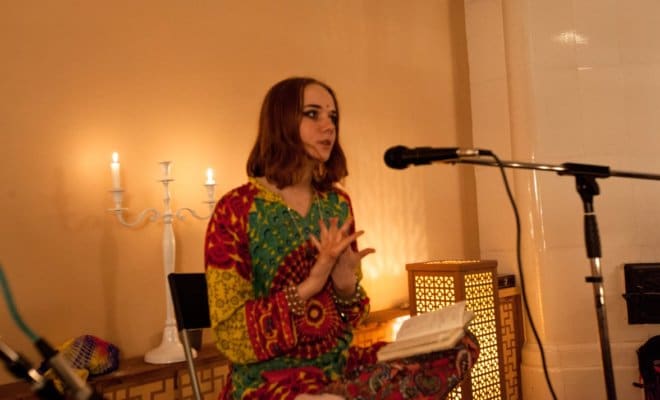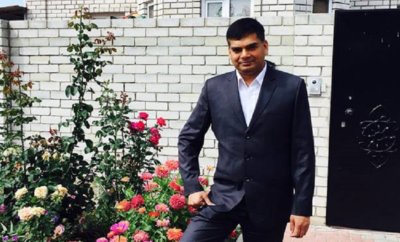Arts
‘I Want to Dissolve in Indian Culture’

Russian poet Stefania Danilova
India helps people fight their fears, pride, and takes them out of their comfort zones, says Russian poet Stefania Danilova, who is looking forward to her performance in the country.
Words have always cast a spell over Russian poet Stefania Danilova. The 23-year-old has already published seven books of poetry, and is working on her latest one. Now the young poet from Saint Petersburg is all set to weave magic with her words in India through her concert tour in January.
“One of my key creations named Take Me, the Sea has already been translated in Hindi. I have been trying to read it aloud in Hindi, and I can now claim that I know it by heart,” she says.
Danilova, however, says that concerts are not what keeps her going. It is the love for words that makes her passion for them grow deeper. She started out quite young — at the age of 15 — and never looked back ever since. “My mother tried to inculcate both the rhythm and rhyme in me and she also taught how to fuse both. When I was 15 I won a poetry competition in Russia and my poems were published in the competition’s publication,” Danilova recalls how her journey began.
It was at this juncture that she started giving penning poems a serious thought. In 2011, while she was still in college, Danilova came out with her first book — Reminiscences. The next year saw her publishing three books — Splin-Sindromnie, Forget-me-not and 366 Revolutions (translated from Russian).
Over the years, Danilova has performed in about 100 live concerts and is currently occupied with her latest book, Nemorgaya, which is a wordplay. “In Russian it means ‘Not blinking’ or ‘Not morgue, but me.’ The book is about various dead relationships like friendship, romance, parenting, and how we want to revive them,” she elaborates.

Russian poet Stefania Danilova during a performance
As a child, Danilova was fascinated with the Indian culture. She grew up seeing her mother practice Yoga, and chanting Sanskrit mantras. Her love for Indian literature, especially poetry, is reflected clearly in the wide variety of translations of Indian poets she has read, including works of Sri Aurobindo, Rabindranath Tagore, Amrita Pritam, Desik Vinayam Pillay, Ullur Parameshvara Ayyar and Dhani Ram Chatrik.
As someone who has always admired the Indian culture from a distance, she feels that a visit to the country changes the perspective of people. “Each of my friends, who has returned from India, has started to see things differently,” she says. “India helped them fight their fears and pride, and took them out of their comfort zones.”
Danilova’s passion for poetry helps her look into many dimensions of life. “My verses are dialogues with songs and books, memories and prophecies, nostalgia and hopes, lost and found keys,” she says. In fact, for every poetry that she writes, there exists a connection with her life.
Danilova is hopeful that her upcoming trip to India will make her acquainted with the colorful Indian culture and also help her seek knowledge about her identity as a poet and as a person.
Ask her what she likes about the country, and she is quick to respond. “I want to see how the art community in India functions, since not all of them are privileged,” she says. “Some artists in India have very humble beginnings. It will be an experience of a lifetime to observe and learn from some of them.”
Although she is yet to visit India, it has not stopped her from writing about the country. Danilova has written prose and poetry inspired by Yoga, shores of the Indian Ocean, the Bauls (mystic minstrels from West Bengal and Bangladesh) and Indian gods. “All this is an inseparable part of me that wants to grow,” she says.
During her 16-day tour in India, Danilova also wants to interact with Indians to know how they lead they simple, contented lives they are known for. “During one leg of my tour, my friend who is a musician will also join me and we aim to perform on the streets of India, especially in places like Puri and Auroville,” she says. She also plans to learn conversational Hindi, soak in the sights and sounds of Delhi, Agra, Varanasi and Goa, and include them in a book of prose.
Danilova’s first book of prose, Atlas of Memory: Meds For Amnesia (title translated from Russian) will be published soon. She wants to dedicate the next one to her experiences in India.
“I want to paint life with not artificial colors but the real ones,” she says. “And, of course, I want to dissolve in the culture that the colorful Indian streets offer.”




You must be logged in to post a comment Login